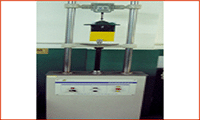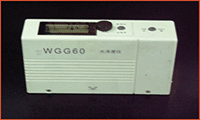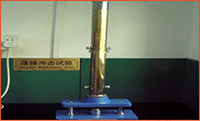1. Metal Content Test
 Metal coils are one of the important materials of aluminum composite panel manufacturing. The metal spectrometer imported from Germany is specially used for the chemical composition detection of various metal materials (including aluminum coils). The high-purity argon and spectral analysis techniques are used to obtain accurate analysis results. All aluminum coils purchased by our company are chemically tested in batches and judged and accepted according to GB/T3190 national standards to ensure the quality of aluminum coils.
Metal coils are one of the important materials of aluminum composite panel manufacturing. The metal spectrometer imported from Germany is specially used for the chemical composition detection of various metal materials (including aluminum coils). The high-purity argon and spectral analysis techniques are used to obtain accurate analysis results. All aluminum coils purchased by our company are chemically tested in batches and judged and accepted according to GB/T3190 national standards to ensure the quality of aluminum coils.
2. Hardness Test
 Metal coils are one of the important materials of aluminum composite panel manufacturing. The metal spectrometer imported from Germany is specially used for the chemical composition detection of various metal materials (including aluminum coils). The high-purity argon and spectral analysis techniques are used to obtain accurate analysis results. All aluminum coils purchased by our company are chemically tested in batches and judged and accepted according to GB/T3190 national standards to ensure the quality of aluminum coils.
Metal coils are one of the important materials of aluminum composite panel manufacturing. The metal spectrometer imported from Germany is specially used for the chemical composition detection of various metal materials (including aluminum coils). The high-purity argon and spectral analysis techniques are used to obtain accurate analysis results. All aluminum coils purchased by our company are chemically tested in batches and judged and accepted according to GB/T3190 national standards to ensure the quality of aluminum coils.
4. Infrared Moisture Test
6. Peel-off Test
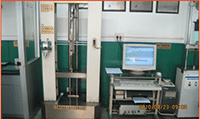 Peel strength is an important feature of aluminum composite panel. This testing machine is used for aluminum-plastic panel for building curtain wall and ordinary aluminum composite panel for decoration. Roller peel test and 180° peel test can be performed separately. We use a computer-controlled universal testing machine to measure the peel strength, and each batch of sampling is much higher than the national standard. (GB: curtain wall roller peel strength ≥ 130N · mm/mm, decorative plate 180° peel strength ≥ 4N/mm).
Peel strength is an important feature of aluminum composite panel. This testing machine is used for aluminum-plastic panel for building curtain wall and ordinary aluminum composite panel for decoration. Roller peel test and 180° peel test can be performed separately. We use a computer-controlled universal testing machine to measure the peel strength, and each batch of sampling is much higher than the national standard. (GB: curtain wall roller peel strength ≥ 130N · mm/mm, decorative plate 180° peel strength ≥ 4N/mm).
7.Flexural Strength And Flexural Modulus Test
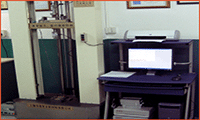 Bending strength, bending elastic modulus, penetration resistance and shear strength are the basic mechanical properties and parameters of aluminum composite panels, and they are the important basis for users to design their structures. Alusign use this computer-operated universal testing machine to perform spot checks on these properties. Each test was designed with a precision special fixture, and the test results were highly accurate.
Bending strength, bending elastic modulus, penetration resistance and shear strength are the basic mechanical properties and parameters of aluminum composite panels, and they are the important basis for users to design their structures. Alusign use this computer-operated universal testing machine to perform spot checks on these properties. Each test was designed with a precision special fixture, and the test results were highly accurate.
8. Finish Film Thickness Test
 The coating thickness is directly related to the life and performance of the coating and aluminum composite panel. National standard : fluorocarbon coating thickness ≥ 25μ, fluorocarbon three coating thickness ≥ 32μ, polyester coating thickness ≥ 16μ, we use the German precision thickness gauge to test. Alusign has four models of various thickness gauges in Germany.
The coating thickness is directly related to the life and performance of the coating and aluminum composite panel. National standard : fluorocarbon coating thickness ≥ 25μ, fluorocarbon three coating thickness ≥ 32μ, polyester coating thickness ≥ 16μ, we use the German precision thickness gauge to test. Alusign has four models of various thickness gauges in Germany.
11. Acid, Alkali Resistance Test
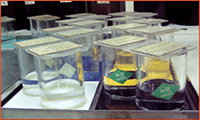 This test is a test of the corrosion resistance of the coating. Our company uses capping impregnation. National standard fluorocarbon and polyester coatings are used separately: The polyester coating is impregnated with 2% hydrochloric acid, calcium hydroxide and standard cement with water for 24 hours; The fluorocarbon coating is impregnated with 5% hydrochloric acid and sodium hydroxide solution for 24 hours; the coating should be unchanged.
This test is a test of the corrosion resistance of the coating. Our company uses capping impregnation. National standard fluorocarbon and polyester coatings are used separately: The polyester coating is impregnated with 2% hydrochloric acid, calcium hydroxide and standard cement with water for 24 hours; The fluorocarbon coating is impregnated with 5% hydrochloric acid and sodium hydroxide solution for 24 hours; the coating should be unchanged.
12. Abrasive Test
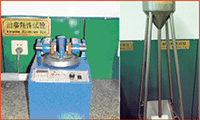 The wear resistance mainly reflects the abrasion resistance of the coating. The national standard stipulates that the sand falling method is adopted to abrade the amount of standard sand used for coating of unit thickness. Internationally, the rubber grinding wheel method is used to represent the weight loss of a coating after a certain number of grindings. Both of these test methods are available in our company.
The wear resistance mainly reflects the abrasion resistance of the coating. The national standard stipulates that the sand falling method is adopted to abrade the amount of standard sand used for coating of unit thickness. Internationally, the rubber grinding wheel method is used to represent the weight loss of a coating after a certain number of grindings. Both of these test methods are available in our company.
13. High Temperature, Low Temperature Test
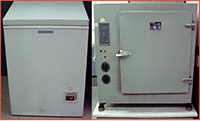 This is a group of high and low temperature test combinations. After sampling from the factory, the aluminum plastic board is subjected to high temperature 80°C for 2 hours and low temperature -40°C for 2 hours. The cycle is 20-50 cycles, confirming no cracking or change. After that, make an adhesion test on the specimen.
This is a group of high and low temperature test combinations. After sampling from the factory, the aluminum plastic board is subjected to high temperature 80°C for 2 hours and low temperature -40°C for 2 hours. The cycle is 20-50 cycles, confirming no cracking or change. After that, make an adhesion test on the specimen.
14. Normal Weather Test
 This test mainly tests the durability of the product under natural environmental conditions. Our country's exposure field is built on Hainan Island. We have sent samples to the China Building Materials Testing Center and commissioned the test. At the same time, we also conducted natural exposure tests on the roof of the plant.
This test mainly tests the durability of the product under natural environmental conditions. Our country's exposure field is built on Hainan Island. We have sent samples to the China Building Materials Testing Center and commissioned the test. At the same time, we also conducted natural exposure tests on the roof of the plant.
15. Material PCS Test
 Calorific value is an important indicator of A2 non-combustible metal composite core material. The material calorific value tester is dedicated to the detection of calorific value of various core materials. All the A2 non-combustible core materials used by our company are tested for calorific value in batches according to the provisions of GB8624-2012 national standards, so as to ensure that the flame retardancy of the products complies with national standards.
Calorific value is an important indicator of A2 non-combustible metal composite core material. The material calorific value tester is dedicated to the detection of calorific value of various core materials. All the A2 non-combustible core materials used by our company are tested for calorific value in batches according to the provisions of GB8624-2012 national standards, so as to ensure that the flame retardancy of the products complies with national standards.




